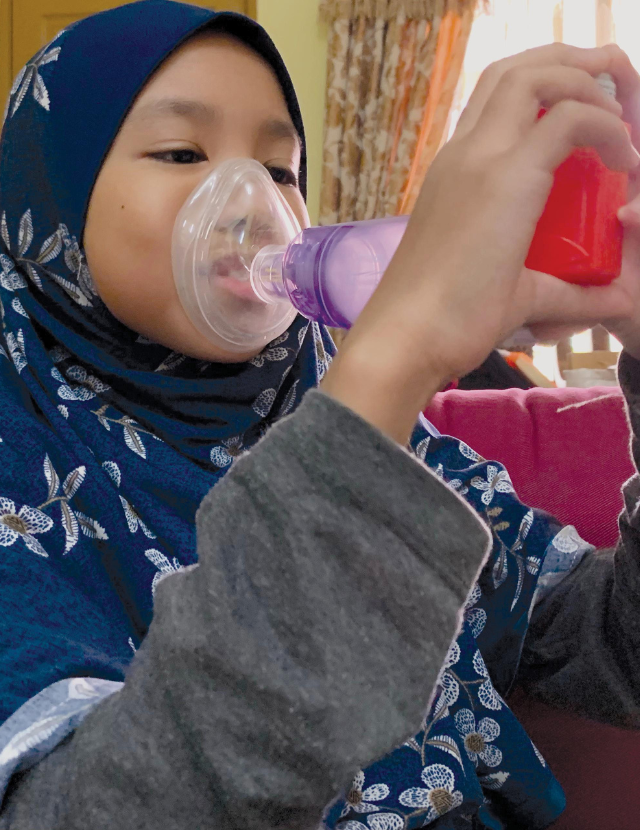Community Health Workers Play Critical Role in Reducing Asthma’s Burden on Low-Income, Communities of Color
Highlights

PHI’s Regional Asthma Management & Prevention (RAMP) program helped to support and build the capacity of Community Health Workers who work closely with asthma home visiting programs and help to improve outcomes for patients with chronic asthma.
$15M investment from the state for the Asthma Mitigation Project
28 asthma home visiting programs make up the Asthma Mitigation Project
100+ Community Health Workers build their capacity each year to improve asthma management skills and be able to offer critical tools that help adults and children control their asthma
92% of participants in the Asthma Mitigation Project felt comfortable with their home visitor (Community Health Worker or Promotora)
96% of participants in the Asthma Mitigation Project felt that their home visitor (Community Health Worker or Promotora) respected their families' cultural, racial, or ethnic beliefs and values
-
Focus Areas
Capacity Building & Leadership, Healthy Communities -
Issues
Asthma, Workforce Development -
Expertise
Health Education & Promotion, Public Policy Development
Asthma disproportionately affects low-income communities and communities of color. Community Health Workers or Promotoras play an essential role in asthma management and helping to bridge the gap between patients and providers. The Public Health Institute’s Regional Asthma Management & Prevention (RAMP) program remains committed to addressing health inequities that exist in asthma care, management and outcomes and does this by building the capacity of Community Health Workers, providing technical assistance to asthma home visiting programs and advocating for much-needed policies and programs in California.
The Role of Community Health Workers and Promotoras
Many asthma home visiting programs rely on Community Health Workers to provide home visiting services and offer critical tools to help adults and children control their asthma and be healthy and active.
Community Health Workers or Promotoras are a central part of the success of the statewide Asthma Management Project and work closely with community members and partners to address disparities related to asthma and bridge the health gap. The Community Health Workers serve as an extension of public health or healthcare and build their capacity to improve asthma management through RAMP workshops which offer training, tools and support and are held multiple times throughout the year.
The Community Health Workers/Promotoras come from and live in low-income communities of color in which the project serves. They represent the diversity of these communities, speak the same languages and are trusted by community members who live there.
An evaluation of the Asthma Mitigation Project found that 92% of participants felt comfortable with their home visitor (Community Health Worker, Promotora, or other type) and 96% felt that their home visitor respected their families’ cultural, racial, or ethnic beliefs and values.
Asthma Mitigation Project (2020-2023)
The Asthma Mitigation Project is a statewide grant program made up of 28 asthma home visiting programs and over 100 Community Health Workers who are serving low-income neighborhoods throughout the state, focusing on asthma management and environmental trigger remediation, and decreasing the health impacts of asthma on adults and children. The project is a $15 million investment from the state and was brought about as a result of years of policy and advocacy efforts by RAMP and its partners.
From 2020-2023, RAMP served as a technical assistance provider, supporting and building the capacity of the 28 asthma home visiting programs to provide comprehensive asthma education and environmental asthma trigger mitigation through home visits using a culturally responsive, participant-centered and holistic approach.
A 2024 evaluation, released by the Center at Sierra Health Foundation (AMP administrator), found that funded partners successfully reached AMP’s priority populations, including communities of color and other historically underserved or under-resourced communities with higher rates of poorly controlled asthma. In total, 4,745 participants were enrolled in the AMP program between August 2020 and May 2023, and partners conducted 19,478 home visits—including both in-person and virtual visits, as well as environmental assessments. AMP participants reported a positive experience with AMP services. Almost all participants (95%) were satisfied with the AMP services provided to them.
Learn more about asthma home visiting services: Explore RAMP’s asthma home visiting services directory, which provides basic information about asthma home visiting programs in California, including service areas, services provided, client eligibility and contact information.
Work With Us
You change the world. We do the rest. Explore fiscal sponsorship at PHI.
Support Us
Together, we can accelerate our response to public health’s most critical issues.
Find Employment
Begin your career at the Public Health Institute.
